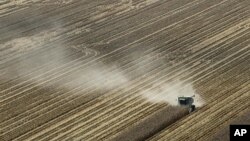The World Bank says droughts in the United States and Eastern Europe are pushing global food prices sharply higher.
The international lending agency says that prices surged 10 percent in July, with the cost of vital corn and soybean crops reaching all-time highs. Soaring summertime temperatures in the U.S. and Eastern Europe have left many farmlands scorched and plants withered.
Overall, the World Bank said its Food Price Index that tracks internationally traded food commodities was 6 percent higher in July than a year earlier.
From June to July, the World Bank said the price of corn and wheat jumped 25 percent, with soybeans up 17 percent. Only rice fell, by 4 percent.
World Bank president Jim Yong Kim said the rising prices threaten "the health and well-being of millions people," particularly in Africa and the Middle East.
The World Bank said sub-Saharan Africa is particularly vulnerable, with the price of corn up 113 percent in Mozambique, and the cost of sorghum up in Sudan and South Sudan.
Kim said the World Bank is spending $9 billion this year to support various agricultural programs around the world, its most in 20 years.
The international lending agency says that prices surged 10 percent in July, with the cost of vital corn and soybean crops reaching all-time highs. Soaring summertime temperatures in the U.S. and Eastern Europe have left many farmlands scorched and plants withered.
Overall, the World Bank said its Food Price Index that tracks internationally traded food commodities was 6 percent higher in July than a year earlier.
From June to July, the World Bank said the price of corn and wheat jumped 25 percent, with soybeans up 17 percent. Only rice fell, by 4 percent.
World Bank president Jim Yong Kim said the rising prices threaten "the health and well-being of millions people," particularly in Africa and the Middle East.
The World Bank said sub-Saharan Africa is particularly vulnerable, with the price of corn up 113 percent in Mozambique, and the cost of sorghum up in Sudan and South Sudan.
Kim said the World Bank is spending $9 billion this year to support various agricultural programs around the world, its most in 20 years.





